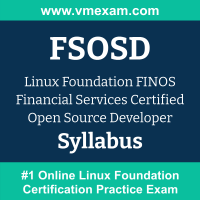 The Linux Foundation FSOSD exam preparation guide is designed to provide candidates with necessary information about the Financial Services Open Source Developer exam. It includes exam summary, sample questions, practice test, objectives and ways to interpret the exam objectives to enable candidates to assess the types of questions-answers that may be asked during the FINOS Financial Services Certified Open Source Developer (FSOSD) exam.
The Linux Foundation FSOSD exam preparation guide is designed to provide candidates with necessary information about the Financial Services Open Source Developer exam. It includes exam summary, sample questions, practice test, objectives and ways to interpret the exam objectives to enable candidates to assess the types of questions-answers that may be asked during the FINOS Financial Services Certified Open Source Developer (FSOSD) exam.
It is recommended for all the candidates to refer the FSOSD objectives and sample questions provided in this preparation guide. The Linux Foundation Financial Services Open Source Developer certification is mainly targeted to the candidates who want to build their career in Open Source Best Practice domain and demonstrate their expertise. We suggest you to use practice exam listed in this cert guide to get used to with exam environment and identify the knowledge areas where you need more work prior to taking the actual Linux Foundation FINOS Financial Services Certified Open Source Developer exam.
Linux Foundation FSOSD Exam Summary:
|
Exam Name
|
Linux Foundation FINOS Financial Services Certified Open Source Developer |
| Exam Code | FSOSD |
| Exam Price | $250 USD |
| Duration | 90 minutes |
| Number of Questions | 60 |
| Passing Score | 75% |
| Schedule Exam | Linux Foundation |
| Sample Questions | Linux Foundation FSOSD Sample Questions |
| Recommended Practice | FINOS Financial Services Certified Open Source Developer (FSOSD) Practice Test |
Linux Foundation Financial Services Open Source Developer Syllabus:
| Section | Objectives | Weight |
|---|---|---|
| Ethics and Behavior |
- Understanding escalation paths
- Engaging with open source communities |
10% |
| Open Source Licensing |
- Comply with open source license obligations
- Understanding implications of Unlicensed Software - Understanding copyrights and licenses - Understanding Contributor License Agreements (CLA) and Developer Certificate of Origins (DCO) |
18% |
| Consuming Open Source |
- Understanding the Software Supply Chain
- Evaluate and maintain code dependencies - Identify software vulnerabilities - Managing third party applications and code - Managing vulnerability, monitoring, and maintenance plans - Understanding approval processes for using open source software - Evaluate codebase risk |
26% |
| Contributing to Open Source |
- Understanding risk of contributing to Open Source, including Data Leakage Risk, Dependency Risk, and Operational Risk
- Understand the benefits of contributing to open source projects - Understanding ownership of copyright and Intellectual Property implications of contributing to open source - Understand the importance of contribution approval processes - Understand publication review processes - Understanding the differences and limitations between Firm Projects, Personal Projects, and Open Source Projects - Understanding the role of an OSPO in an organization |
28% |
| Regulatory Impact on Open Source |
- Understanding regulations around communication surveillance
- Understanding social media policies - Understanding the compliance processes around open source contribution - Understanding IP regulations around data within a bank |
18% |
